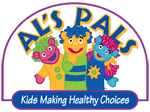
About Al's Pals
CSB Wellness, Health Promotion and Prevention Services coordinates the implementation of Al’s Pals, a SAMHSA Model Prevention Program developed by Wingspan, LLC. The program is implemented in collaboration with full or half-day programs in Head Start, community and faith-based early childhood education programs, and is delivered within the regular classroom setting. Al's Pals is part of a grant initiative awarded through the Virginia Foundation for Healthy Youth. For more information, call CSB Wellness, Health Promotion and Prevention Services at 703-383-8430.
The CSB has several objectives in undertaking this program:
- Expand prevention programming to include early childhood programs
- Support school readiness initiatives in Fairfax County, and
- Build the community’s capacity to implement and sustain effective prevention programming.
Al’s Pals: Kids Making Healthy Choices is a resiliency-based early childhood curriculum and teacher training program that develops personal, social, and emotional skills in children 3 to 8 years old. Using 46 interactive lessons, Al’s Pals teaches children how to:
- Express feelings appropriately
- Use kind words
- Care about others
- Use self-control
- Think independently
- Accept differences
- Make friends
- Solve problems peacefully
- Cope
- Make safe and healthy choices
- Understand that tobacco, alcohol and illegal drugs are not for children
The lessons use guided creative play, brainstorming, puppetry, original music, and movement to develop children’s social-emotional competence and life skills. A nine-lesson booster curriculum is used in second or third grade with children who have previously received the full program.
Target Population
Al’s Pals was originally designed for and piloted with preschool children considered to be at-risk due to poverty and other factors. The program was initially piloted in Head Start and other community-based child development centers whose populations primarily included African-American and Caucasian children. Since the initial pilot, the program has been expanded and found to be effective with children 3 to 8 years old of all socioeconomic and racial backgrounds living in urban, suburban and rural areas. Al’s Pals has been proven to work in preschools, early elementary school grades, after-school programs and child care centers.
Proven Results
- Children who participate in Al’s Pals are 2 to 5 times more likely to improve their use of positive social behaviors than children who do not participate. Positive social behaviors include sharing, taking turns, using self-control, helping others, and using words to solve problems.
- Children who participate in Al’s Pals are 1.5 to 4 times more likely to improve their use of positive classroom coping skills than children who do not participate. Examples of positive classroom coping skills include talking about a problem with a friend or teacher or asking for help to solve a problem.
- Children who do not participate in Al’s Pals are 2 to 6 times more likely to increase their use of antisocial and aggressive behaviors than children in Al’s Pals. Antisocial/aggressive behavior includes hitting, kicking, name-calling, bullying and destroying others’ belongings.
Intervention
- Universal
Benefits
- Strengthens children’s social and life skills.
- Prevents increased aggressive/anti-social behavior that might otherwise occur.
- Helps children differentiate between safe and harmful substances and situations.
- Helps children manage their own behavior, freeing teachers to do more teaching.
How It Works
Al’s Pals has 46 core lessons that capture real-life childhood experiences and provide opportunities for the children to acquire and practice social and emotional skills. Designed for preschool, kindergarten and first-grade children, a classroom teacher delivers lessons for 10 to 15 minutes twice a week. An original hand puppet named Al is at the heart of the program, and serves as a positive role model. In addition to Al and puppet pals Ty and Keisha, children are engaged through a wide range of teaching tools including scripted puppet-led discussions, guided creative play, original songs, posters, color photographs, message pads and books.
Through the lessons, children learn and practice positive ways to express feelings, relate to others, communicate, differentiate between safe and unsafe substances and situations, brainstorm ideas and solve problems. By reinforcing the Al's Pals concepts throughout the day, the teacher shapes a caring environment, encouraging independent thinking, use of self-control, healthy decision-making, and peaceful problem solving. A nine-lesson booster curriculum may be used during the second or third grade to reinforce skills learned through the core lessons.
Al’s Pals includes a parent component. Letters from Al are regularly sent home to inform parents about the life skills their children are learning and suggest activities parents can use to help their children practice and retain these skills. The curriculum also includes "Al-a-grams" – school-to-home messages, delivered home by the children, that recognize positive behavior noted at school (e.g., caring about others’ feelings or calming down).

